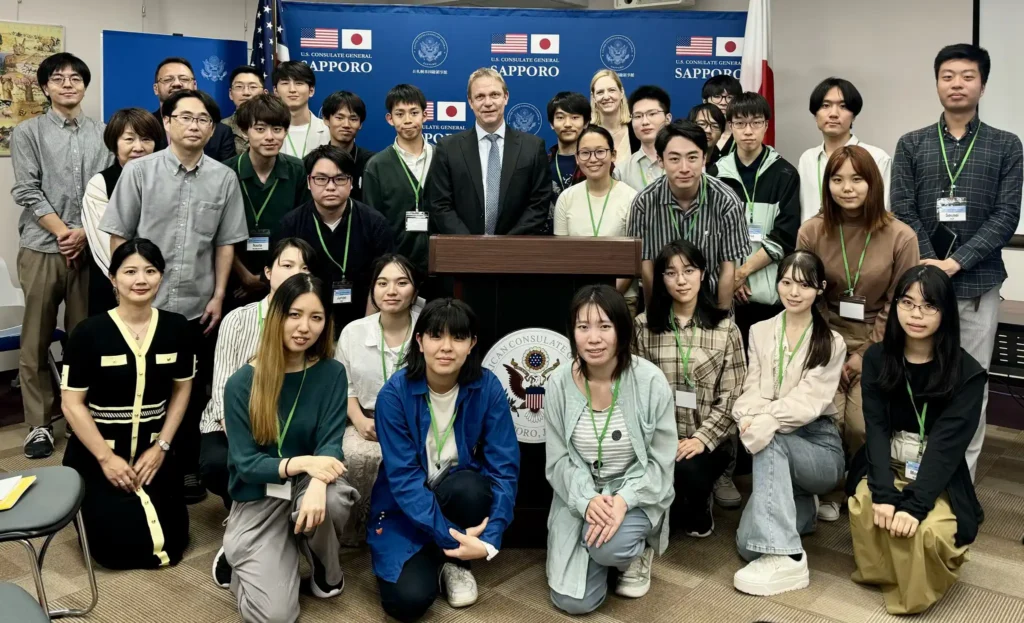NSFA’s U.S.-Japan Diplomacy Academy Fulfills State Department’s Grant Request
Imagine it is 2026. China and Russia have engaged Japan and the United States in combat over Taiwan and the situation is on the verge of escalating to an all-out war. You have been tasked with finding diplomatic and military solutions to prevent war while limiting the conflict’s effect on your country’s economy and national security.
That is the exact simulation that Japanese students from Hokkaido University and Tohoku University faced at the conclusion of their week-long U.S. – Japan Diplomacy Academy (Academy) in September.
Funded through a grant from the U.S. Department of State, U.S. Embassy-Tokyo, and U.S. Consulate General-Sapporo, the Academy was developed and presented by the Howard H. Baker Jr. School of Public Policy and Public Affairs’ (Baker School) Center for National Security and Foreign Affairs (NSFA) at the University of Tennessee, Knoxville. NSFA Director Krista Wiegand and UT lecturer Elis Vllasi traveled to Japan and collaborated with faculty from host universities to present a unique week-long learning opportunity to students in northern Japan.

The State Department requested proposals to produce a program that would expose northern Japanese students to U.S. and Japanese diplomacy and partnership. Wiegand, who has vast experience and knowledge of the region and a strong record of developing diplomacy courses and programs, developed a five-day intensive diplomacy academy, along with Vllasi and the participating Japanese faculty.
Having visited Hokkaido University in 2022 with a delegation from UT’s Center for Global Engagement, she reached out to the local faculty, asking if they would be interested in participating. It was an easy ask. At Tohoku University, she didn’t know anyone personally, but they were also very eager to participate. Both universities are prestigious, national public universities, similar in size and scope to UT.
“When you bring together faculty and students from two different countries and cultures the educational benefits are far richer than what students are normally exposed to,” Wiegand said.
Each of the Japanese universities promoted the opportunity to its student body and other local universities. Scheduled two weeks prior to the term beginning, 20 and 25 students participated in each program. The participants were not all international relations studies students, and Wiegand was delighted to have a wide range of disciplines represented, including engineering, business, and food science.
The lectures were taught in English, with the Japanese faculty interpreting when needed, especially on more specific terms. Wiegand noted a significant improvement in the students’ English by the end of the week, especially in their presentations.
A 5-day intensive Academy
The intensive program started with a foundation of international relations content, including classes on power politics, alliances, diplomacy, and hybrid warfare.
Students were instructed on the importance of strategic communications and its benefits in writing policy briefs and working within the Japanese government. They also had interactions with U.S. diplomats from the U.S. Consulate, Sapporo, and with Japanese Ground Self Defense Forces (JGSDF) and visited JGSDF bases.
The Academy concluded with the simulation exercise. On the first day of the simulation, students researched and wrote policy briefs as if they were briefing the Japanese prime minister and on day two, they presented their findings and recommendations in a formal briefing with JGSDF officers present.
The simulation gave students an idea of what takes place for a government during a crisis. They saw firsthand how the military and government must cooperate when making a decision. They were taught and used the DIME approach, which stands for diplomacy, information, military, and economics, working as a team to approach the crisis with those aspects under a time crunch, with high stakes.
Wiegand hopes that the students who participated continue their interest in international relations, no matter what careers they choose. She said the experience should provide a consciousness of how foreign affairs affect their everyday lives.
The mission of NSFA is to provide critical insights into national and international security challenges and foreign policy solutions. This academy gave NSFA the opportunity to broaden the experience and education of Japanese students in national security and foreign affairs through experiential and hands-on learning.
Wiegand hopes to present the Academy in Japan again in 2026 and is pursuing funding to host a similar experience for American students at UT. She hopes to recruit Japanese faculty to travel to Knoxville. Wiegand and her faculty collaborators from Hokkaido University and Tohoku University have spoken about continuing their working relationship through partnerships and joint faculty research. Wiegand also noted she wants to see the Baker School and the University hosting faculty from other countries.